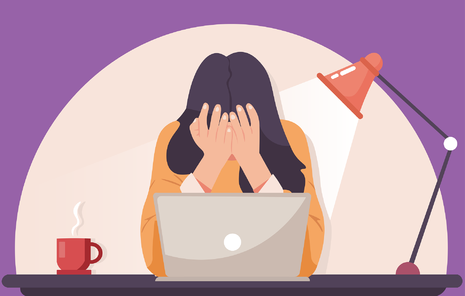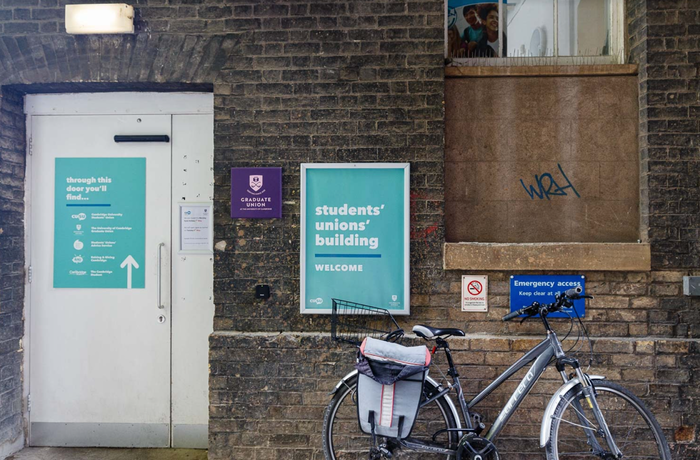Over 80% say their mental health would improve with less work: Cambridge must rethink workload and the eight week term
Following the recent SU decision to support a reading week, Shannon Rawlins reflects on a survey that she has carried out, and calls for Cambridge to adopt this policy as a matter of urgency.

I had time to research and write this article at least in part because I am a History student and we - notoriously - have a low workload and few contact hours. Student journalism is teeming with historians and English students, not just because we like writing, but because we actually have that wonderful thing which everyone deserves and needs: free time. One would assume that being in lockdown would create more free time. But, according to a survey I recently conducted, nearly all students are behind on their work. Over 80% say their mental health would be better if they had a lower workload (65% ‘definitely’ and 17% ‘probably’).
Remote learning has exposed the harmful effects of being in a constant battle with time. The amount of time ‘available’ each day is patently not the problem: it is the almost inevitable stress caused by the pressure of having to cover a vast amount of content in such little time, and having so many deadlines to meet. This stress makes us less productive, and that horrible feeling of not having done ‘enough’ multiplies it, trapping us in a vicious circle. The problems with workload and short terms have always existed; they just get forgotten in the bustle of term-time.
“Remote learning has exposed the harmful effects of being in a constant battle with time.”
People took part in my survey on a voluntary basis, so its validity as a genuine sample of Cambridge students is not guaranteed, but I did receive a reasonable 85 responses. The results of this survey – alongside anecdotal evidence and a sense of popular sentiment gauged from Camfess (a reliable barometer of student opinion, of course) – led me to conclude that Cambridge should re-evaluate the impact of high workloads and short terms.
In a normal scenario when we are here in person, the intensity of the classic ‘Cambridge lifestyle’ works - just about - because everyone is in the same boat: living frantically; pulling all-nighters; working until 9 or 10pm before going out and getting drunk; squeezing in sports and societies alongside the academic work. It could even be deemed exhilarating or stimulating - but certainly not healthy. Now, no one is exhilarated or stimulated. 60% of students feel more stressed and overwhelmed by their work compared to pre-pandemic. Across the board, remote learning has led to unhealthy, sedentary lifestyles. Students spend endless hours sitting in front of a computer as they struggle to complete all of their work. Some people have parents who don’t ‘get it.’ We have no proper lectures (Panopto recordings don’t count) nor labs and we cannot go to the library or a café to vary our working environment. These are the facts of remote learning, common to every student across the country, but at Cambridge, studying from home has laid bare the inherent problems of an intense workload in such short terms.
SU President Ben Margolis’ proposal is an important part of the solution to this problem. He has suggested some modest changes to the structure of Lent and Michaelmas terms. The start of term would be moved forward three days, and the end of term back two, which would create an entire new week in the middle of term – a reading week. This would still fit into the ten week lease structure that the vast majority of colleges offer. Nearly 70% of students surveyed agree that the terms should be longer and on Monday the Student Union voted to campaign for a reading week.
Over half (54%) of students spend more than seven hours on university work each day. Accounting for meals, inevitable moments of distraction, and (hopefully) breaks, this leaves little time for much else. How much work students ‘should’ be doing is debatable; some might argue that 7 or 8 hours a day is perfectly reasonable. But, judging from anecdotal evidence, few students have a healthy working pattern – and should they be expected to have one? Your workload as a student is not meant to reflect that of a salaried job. Many tend to work late into the night, desperately trying to stay on top of the never-ending stream of assignments, supervision preparation, and reading.
Nearly a quarter of respondents ‘rarely’ engaged in self-care during term-time, and only 20% practise it everyday. Self-care was identified in the survey as ‘things you enjoy and which are good for your mind and body such as having a bubble bath, meditating, calling a friend, doing yoga, and reading for pleasure’. These sorts of activities are essential for one’s wellbeing, more essential than meeting a deadline or finishing that last item on your reading list. Nearly half (49%) of students rate their mental health as five or below out of ten. A quarter rated theirs as three or below out of ten. To me, these figures are saddening – but not surprising.
Nearly all (90%) students say they would enjoy the content of their studies more if they had a lower workload (59% ‘significantly’ and 31% ‘a bit’). Many students talk about becoming ‘sick’ of their subject – some even say they have grown to ‘hate’ it. A few end up switching – and no wonder. It is hard to enjoy something you are consumed by. We do not feel in control of our work and, because we are always behind, we struggle to switch off from it and take a step back.
“Many students talk about becoming ‘sick’ of their subject – some even say they have grown to ‘hate’ it.”
Cutting back on workload would not have to be detrimental to the quality of our learning experience. The uniqueness of Cambridge lies in the supervision system and teaching by experts outstanding in there fields, not in the quantity of work. Breadth might have to be compromised, but I think an improvement in student mental health and enjoyment levels would make this worthwhile. Reducing the compulsory content and giving students more choice over what to study could be a way of relieving some pressure. (History is an example of a Tripos which does this well.) Nearly half (46%) of students agree that it is unfair that some subjects have a significantly higher workload than others. There must be a way of equalising without compromising on the quality of the courses.

SU meeting includes discussions on a reading week, transgender rights and support for rent strikes
Students would work far more effectively and productively if they had less content to plough through and more time in the term to get everything done. We would also enjoy our work a lot more, feeling more motivated and energised to do it. When we are drowning in our work, it is a constant struggle; but when we are swimming with strong, powerful strokes, we take pride and pleasure in what we do, and produce much better results.
 News / Judge Business School advisor resigns over Epstein and Andrew links18 February 2026
News / Judge Business School advisor resigns over Epstein and Andrew links18 February 2026 News / Hundreds of Cambridge academics demand vote on fate of vet course20 February 2026
News / Hundreds of Cambridge academics demand vote on fate of vet course20 February 2026 News / Petition demands University reverse decision on vegan menu20 February 2026
News / Petition demands University reverse decision on vegan menu20 February 2026 News / CUCA members attend Reform rally in London20 February 2026
News / CUCA members attend Reform rally in London20 February 2026 News / Gov grants £36m to Cambridge supercomputer17 February 2026
News / Gov grants £36m to Cambridge supercomputer17 February 2026









